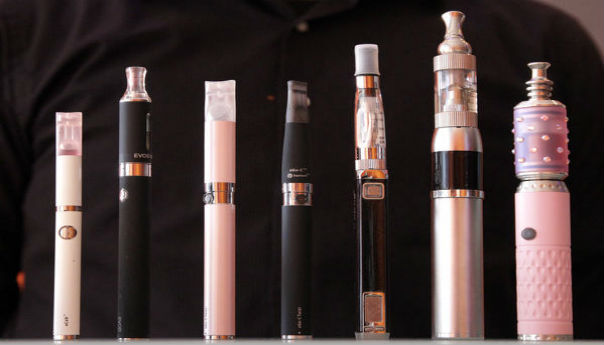What The U.S. Government Doesn’t Want You To Know: E-Cigs Work

Quitting smoking is astoundingly difficult: only about 3% stay quit at 6 months without help. Using nicotine replacement therapy increases that to 9%. The more effective but often-maligned drug Chantix (varenicline) increases it to up to 33% at six months, but after a year, smoking cessation rates even with varenicline may fall to only 11% over placebo.
E-cigarettes are a new option for nicotine replacement. Available at convenience stores and other places where cigarettes are sold, they deliver a shot of nicotine vapor without smoke. Business interests have rushed in to promote e-cigarettes, which today are not regulated as drugs or medical devices by the government. Although their marketplace popularity suggests they work, scientific data on e-cigarettes’ efficacy in smoking cessation, and their safety, have been lacking.
In a proof-of-concept pilot study, Riccardo Polosa et al provided e-cigarettes to 40 Italian pack-a-day smokers. What you need to know here is these people had no interest in quitting smoking, by their self-description. Polosa’s team called them at home (probably catching many of them mid-drag) and offered them the chance to participate. That’s it.
Results, at week 24 (~six months):
- 22.5% were abstinent from cigarettes, confirmed by exhaled carbon monoxide (and 6 of these 9 were still using the e-cigarette).
- A total of 55% had reduced their daily cigarettes smoked by at least half. Most got down to 3-6 cigarettes a day.
- Overall, participants smoked 88% fewer cigarettes.
- Participants used 2-3 e-cigarette cartridges per day.
- Forgive me for repeating myself, but these were people who described themselves as unwilling to quit smoking at the outset.
Dry cough (32%), mouth and throat irritation (20-32%) were common among e-cigarette users (most of whom were continuing to smoke, but ascribed these side effects to the e-cigarettes).
Reaction to these results — and the apparent ability of e-cigarettes to reduce cigarette smoking without eliminating nicotine dependence — has revealed interesting fissures in the antismoking movement.
The more pragmatic, public-health “harm reduction” camp says, in effect, “Duh: Give everyone e-cigarettes.” Nicotine is not particularly harmful by itself, and every puff of an e-cigarette replaces a puff of a real cancer/lung/heart disease-causing cigarette. Ergo, e-cigarettes will save lives. This could become a similar model to methadone clinics for opiate addiction, which are accepted as distasteful but successful where abstinence approaches simply fail. As William Godshall, one of Pennsylvania’s leading anti-smoking advocates put it recently, “E-cigarettes could replace much or most of cigarette consumption in the U.S. in the next decade.”
However, there’s been a surprising counterpush by prominent governmental and non-profit agencies like the FDA, who bizarrely have tried to ban e-cigarettes (even confiscating incoming shipments to the U.S.) and when a federal appeals court ruled they had no authority to do so, fear-mongered that e-cigarettes contain “toxic chemicals” (which Boston U’s Michael Siegel demonstrates are present only in trace amounts compared to the malestrom of known poisons in cigarette smoke). The American Cancer Society and others joined the anti-e-cigarette pile-on, prompting public discussion in a New York Times article.
Given the hyperbolic rhetoric we’ve heard over the years, manufactured by the P.R. arms of nonprofit/government agencies (10 jumbo jets crashing every day, killing everyone aboard!! Each cigarette cuts 8.7 minutes off your life!!), this aggressive resistance to a likely-legitimate new smoking-reduction tool is simply flabbergasting. Sure, e-cigarettes are sketchy and weird, and no one is asking the government endorse them tomorrow. But rather than making ridiculous pronouncements about e-cigarette un-safety that I expect will soon be shown to be untrue (perhaps after large American tobacco or pharma companies take over the product segment), why can’t FDA at least throw an “atta-boy” into the doomsaying press releases? Something rational like “Quitting smoking is hard, and although the risks of e-cigarettes are unknown, they are almost certainly lower than the risks of continuing to smoke.”
Better yet, since smoking is still the #1 public health problem facing the U.S. (with obesity a close second), and with a billion people now smoking worldwide, why does the NIH not step up and write a big check for the study of e-cigarettes in hundreds or thousands of U.S. smokers? Say, a measly five or ten million bucks to start (out of its $31 billion budget)? E-cigarettes have been available for years, and there are exactly four trials listed on clinicaltrials.gov. All of them are in Italy by Polosa’s group.
It looks to me like rather than condemnation, high-profile U.S. government endorsements would be more in order. (Go with me on this for a second.) Although Barack Obama has been tobacco-free for one year, he and his doctors say, he was reported to be usingnicotine gum to stay quit as recently as August 2011. I want our President to be healthy, smoke- and nicotine-withdrawal-free, and all I can say is: You can sneak into the French minister’s restroom to puff on an e-cigarette, but you can’t chew gum at a state dinner.
